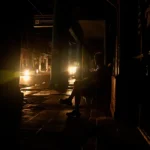
Călin Georgescu, a NATO critic, says people “cry out for peace” after he went into the second round with 22.9% of the vote
An ultranationalist critical of NATO and friendly to Moscow will face a center-right candidate in the second round of Romania’s presidential elections, after a surprise first-round result that shook the country’s politics and could jeopardize its support for Ukraine.
With 99.98% of the votes counted, Călin Georgescu, an independent who praised Vladimir Putin as “a man who loves his country”, received 22.9%, while reformist Elena Lasconi, from the Save Romania Union (USR), was left behind. in second place with 19.17%.
The result is one of the biggest electoral shocks in Romania’s post-communist history, clashing with pre-election polls, which showed Georgescu with 5% and predicted a comfortable victory for the current prime minister, Marcel Ciolacu, who is center-left and pro- European Union. Ciolacu, however, came third with 19.15%.
The president of Romania has a semi-executive role, with significant powers over national security, foreign policy and judicial appointments. The second round is scheduled for December 8, after the parliamentary elections scheduled for next Sunday.
The dispute is being watched beyond Romanian borders, as the country shares a 640 km border with Ukraine and is considered strategic by Western allies, hosting a NATO military base, donating a Patriot air defense battery and serving as a vital route for millions of tons of Ukrainian grain.
“Tonight, the Romanian people cried out for peace. And they screamed very loudly, extremely loudly,” Georgescu, a 62-year-old university professor, said on Sunday. “We are strong and courageous. Many of us voted, and even more will do so in the second round.”
Lasconi, a former war correspondent and TV presenter, joined the center-right USR party in 2018 and became its leader this year. Elected twice as mayor of the small town of Câmpulung, she advocates increased defense spending and support for Ukraine.
Georgescu, who left the Alliance for the Union of Romanians (AUR) following criticism of his pro-Russian and anti-Nato stance, ran a viral campaign on TikTok focused on reducing Romania’s dependence on food and energy imports and ending aid to Ukraine.
The election was largely marked by the high cost of living in Romania: the Black Sea country has the highest proportion of people at risk of poverty in the EU, as well as the highest inflation rate and the bloc’s biggest budget deficit, at 8% of GDP. .
After voting, Georgescu declared on Facebook that he was running “for those who feel they don’t matter, but who are actually the most important.” He later stated that the results were “an extraordinary awakening” of the people.
“There was an expectation, a desire for a vote of revenge, a vote of protest, on the part of people with a lot of frustration, revolt and anger against the system,” international relations expert Valentin Naumescu told the Digi24.ro portal.
According to Naumescu, social media reached many voters who perhaps didn’t even know exactly who Georgescu was, but were “bombarded with ideas that he is a true Romanian, a strong leader for Romania, who has a plan and solutions.”
Georgescu, a sustainable development consultant who has worked at several UN agencies, called NATO’s missile defense shield in Romania a “diplomatic disgrace” and said the alliance would not protect its members from a Russian attack.
He also described Corneliu Codreanu, leader of Romania’s fascist Iron Guard in the 1930s, and Ion Antonescu, who led the pro-German government during World War II and was executed for his role in the Holocaust, as national heroes.
In other interviews, Georgescu stated that Romania is not prepared to handle diplomacy and strategy independently and that its best chance lies in “Russian wisdom.” He has refused to explicitly say he supports Russia in the war against Ukraine.
Radu Magdin, political analyst, highlighted that the difference between the poll numbers, which pointed to a single-digit index for Georgescu, and the result of the first round is unprecedented in Romanian democracy since 1989. “Never in our 34 years of democracy have we seen such a big jump compared to the polls,” he told Reuters.
Cristian Pîrvulescu, a political scientist, told Agence France-Presse: “The extreme right is, by far, the big winner of this election.”
Unlike neighboring Hungary and Slovakia, Romania has resisted populist nationalism, but with AUR’s George Simion finishing fourth, around a third of voters on Sunday voted for far-right candidates.
The result also confirms a global trend of rejection of parties in power: the leaders of Romania’s two governing parties, Ciolacu’s Social Democrats (PSD) and the center-right National Liberal Party (PNL), were eliminated in the first round .
This is the first time in Romania’s post-communist history that the PSD does not have a candidate in the second round of a presidential election. Around 9.4 million people – 52.5% of eligible voters – participated, according to the Central Electoral Office.
Simion faces accusations of meeting with Russian spies, which he denies. Sergiu Mișcoiu, a political scientist, stated that Russian interference cannot be ruled out, given Georgescu’s stance on Ukraine and the discrepancy between polls and results.
The Kremlin stated on Monday that it is not well acquainted with Georgescu’s views but “clearly understands” the position of the current Romanian leadership, which its spokesman, Dmitry Peskov, described as hostile to Russia.
Other analysts have suggested that Georgescu’s unexpected success could influence the December 1 parliamentary elections, making it difficult to form a new stable coalition government.
With information from Reuters, Associated Press, AFP and The Guardian*
Source: https://www.ocafezinho.com/2024/11/25/ultranacionalista-pro-russia-vence-o-1o-turno-na-romenia/

